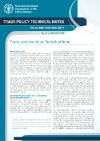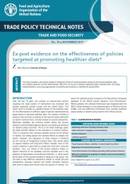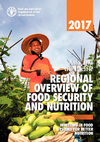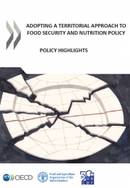资源
当今世界的最大挑战之一是消除饥饿和贫困,实现农业和粮食系统可持续发展。这一挑战艰难而巨大,因为人口在不断增加,粮食需求发生深刻变化,农村青年为谋求更好生活而大量迁移。本报告提出了相关战略,促进挖掘粮食系统潜力,使其成为低收入国家包容性经济发展和农村繁荣的引擎。报告分析了当前的结构性转型和农村转型,考察了这类转型对千百万小规模粮食生产者带来的机遇和挑战。报告阐明了“农业地域”规划方式,通过注重城镇与其周边农村地区建立联系,与农业产业和基础设施发展相结合,如何能够为整个粮食部门带来创收机遇,奠定可持续、包容性农村转型的基础。
The relationship between trade, food security and nutrition is attracting growing attention within the trade and development agendas. The Sustainable Development Goals (SDGs) cite trade as an important means to achieve the goals related to food security and nutrition. In addition, the Rome Declaration on Nutrition and the Framework for Action of the Second International Conference on Nutrition (ICN2) acknowledge that trade can play an important role in reaching nutritional targets.1 How then does international trade actually influence nutrition, and how can the positive impacts of trade on nutrition be maximized?
Over the last 10 years, the number of national-level policies targeting the triple burden of malnutrition has increased very quickly, especially outside Europe and the United States. This report aims to provide an updated picture of the evidence base on the effectiveness for different types of policies implemented by governments to promote healthier diets.
When the international community came together in 2015 to announce its ambitious 17 Sustainable Development Goals (SDGs) the mood was one of optimism. Agenda 2030, as it is now known, would, among other things, lead us to a world without hunger and poverty. Two years later, in 2017, we still believe that we can become the “zero hunger generation.” But the clock is ticking, and while good progress has been made towards eliminating hunger and poverty in the Asia-Pacific region, recent signs suggest that we must redouble our efforts in pursuit of these goals.
The calls for action are numerous: at the United Nations Rio+20 Conference on Sustainable Development in September 2012, governments reaffirmed the fundamental right of everyone to be free from hunger. The same year, the UN Secretary General launched the “Zero Hunger Challenge” campaign to end hunger globally. The United Nations 2030 Agenda for Sustainable Development, endorsed in September 2015, confirms the importance of achieving food security, and eradicating hunger is the second Sustainable Development Goal (SDG 2).





